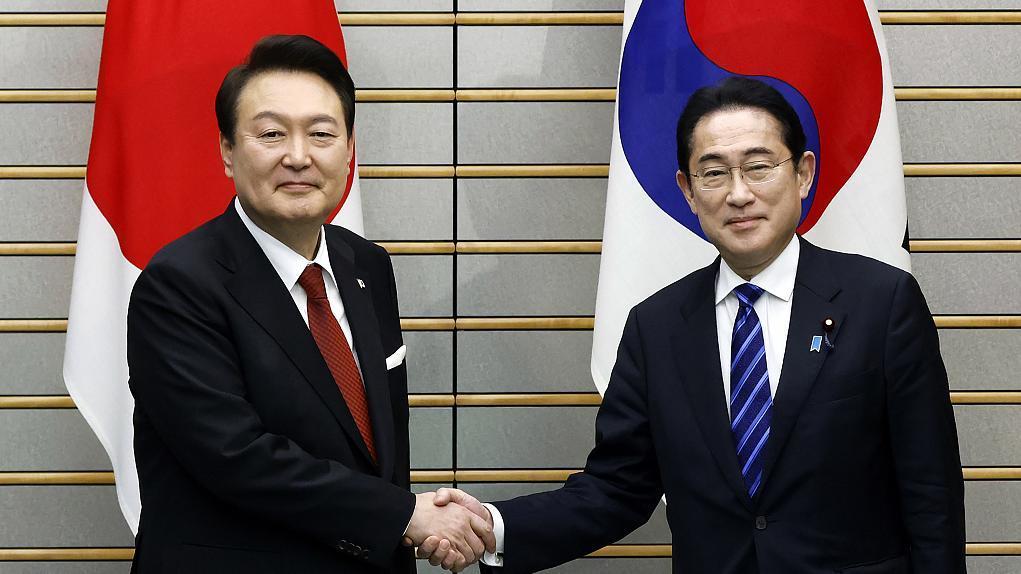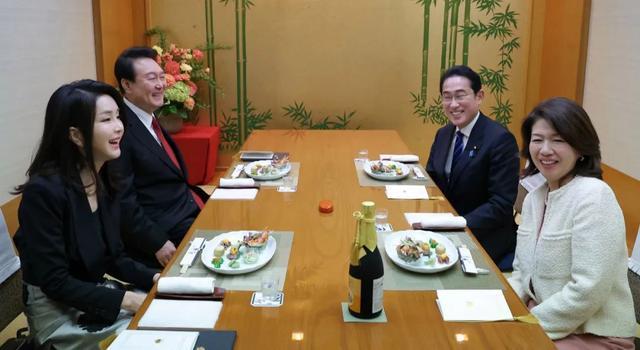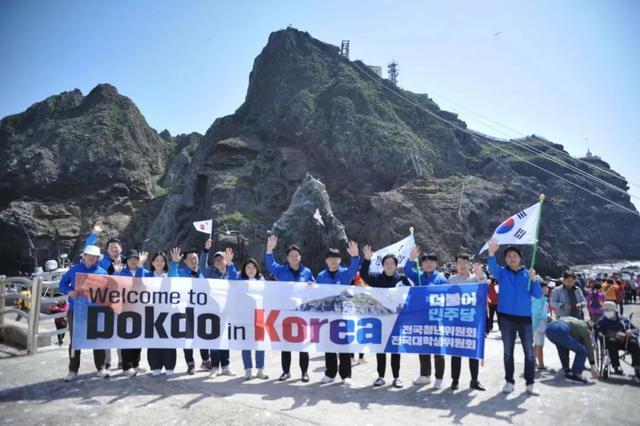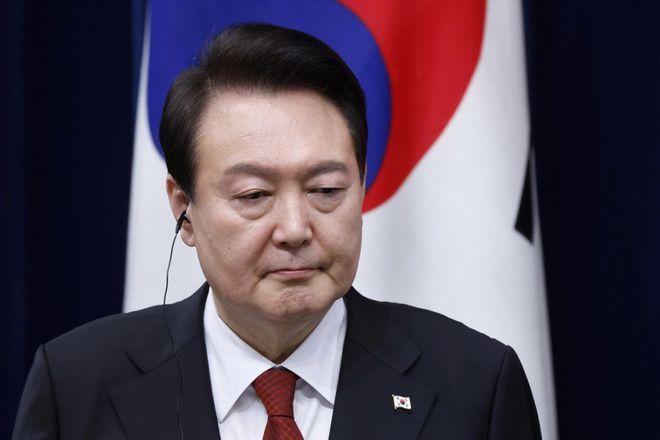After more than 50 days, leaders of Japan and South Korea have resumed their"shuttle diplomacy" with reciprocal visits.

Fumio Kishida, the Prime Minister of Japan, will visit Seoul for a two-day visit on May 7th and 8th, marking the first visit by a Japanese Prime Minister to South Korea in 12 years. This follows South Korean President Yoon Suk Yeol's visit to Tokyo in March, despite criticism and public pressure at home for what many saw as "humiliating diplomacy".
Since March, Yoon's handling of historical disputes between South Korea and Japan, as well as his comments on Japan, have sparked outrage at home. For example, he decided to use private funds to compensate Korean victims of forced labor in Japan, and said in an interview that"I cannot accept the notion Japan must kneel because of our history 100 years ago". Some critics accused him of"kowtowing" to Japan and even suggested he should"naturalize" and move to Japan.
Despite the domestic opposition, Yoon seems determined to push forward. On April 27th, he expressed his loyalty to the US-Japan-Republic of Korea Trilateral Partnership in a speech at the US Congress, citing the growing nuclear and missile threat from North Korea.

According to media reports, on May 3rd, Yoon met with Takeo Akiba, the Director-general of Japan's National Security Council, who relayed the message that Kishida's decision to visit South Korea was a gesture of appreciation for Yoon's"determination". This"determination" refers to Yoon's willingness to make significant concessions on the issue of Korean forced labor during World War II, despite domestic political pressure.
In particular, Kishida's visit has been met with high expectations from the Korean public regarding this issue. But in Japan's view, the matter was already settled with the signing of the 1965 Treaty on Basic Relations between Japan and the Republic of Korea. The treaty included an agreement in which Japan provided 300 million dollars in free aid and 200 million dollars in loans to South Korea, which also covered compensation for laborers. Therefore, Japan no longer recognizes the individual compensation claims of Korean forced labors.
Moreover, despite what many believe to be a significant concession by the administration of President Yoon, right-wing forces in Japan are still not satisfied. They believe that recognizing South Korean organizations as compensation representatives for the laborers is tantamount to admitting individual compensation claims by Korean laborers. They are demanding that South Korea remove the Comfort Women Statues and not pursue further Japanese responsibility.
In light of these issues, it seems unlikely that Kishida will apologize for historical disputes during his visit to South Korea.

Additionally, the dispute over the Dokdo/Takeshima Islands has caused great rifts between the two nations, and there is no easy solution in sight. Even with the US's help in mediating security issues, South Korea and Japan still have diverging interests. Therefore, it is too early to expect any significant progress in terms of territorial and security issues.
In terms of the economic agenda, both South Korea and Japan have recently agreed to restore each other's"white list" status, meaning they will offer each other trade privileges and remove related restrictions. However, analysts say that just as South Korea and Japan are completely dependent on the US for security issues, they are unlikely to be able to make independent decisions in the economic, especially high-tech, field. It remains to be seen whether Kishida's visit will bring any economic benefits to South Korea.
观点评论|尹锡悦向美日“叩头”,屈辱外交能换来什么回报?
日韩领导人时隔50多天实现互访,两国“穿梭外交”正式重启。

岸田文雄将于5月7日至8日对首尔进行为期两天的访问,这将是日本首相时隔12年再次访韩。此前的3月,韩国总统尹锡悦曾顶着国内批评其“屈辱外交”的舆论压力访问过东京。
今年3月以来,尹锡悦对韩日历史争议问题的处理以及多次涉日言论,例如决定自筹资金帮日本赔偿韩国劳工受害者,接受采访时称“无法接受日本须为历史下跪”等等,都在韩国国内引燃怒火,反对派直接炮轰,日本没跪,反倒是尹锡悦先跪了。民众甚至在韩媒报道下留言让尹锡悦“归化去日本吧!”
然而,即便国内怎么反对,种种迹象表明,尹锡悦已经是铁了心打算一条道走到黑了。4月27日,他在美国国会发表演说时就大表“忠心”,称要强化韩美日三边同盟,以应对日益紧迫的朝鲜核导威胁。
媒体报道称,3日,尹锡悦会见了来访的日本国安保障局局长秋叶刚男,后者传话称,岸田拍板提前回访韩国,就是要回报尹锡悦的决断,所谓“决断“意指其不惜承受国内政治压力,在二战劳工问题上向日本作出重大原则性让步。
秋叶刚男口中的“回报”,也确实是韩国舆论对岸田此访的极大期待,但是,这个问题之所以争议这么多年,就是因为在日方看来,半个多世纪前签署的《日韩请求权协定》,当年日方曾向韩方支付了3亿美元无偿援助和2亿美元贷款,其中包括支付给劳工的补偿金,所以问题已解决,日方不再承认韩国个人的索赔权。
此外,即便外界认为尹锡悦政府作出极大妥协,实际上,日本政界右翼势力仍不满意,认为岸田内阁认可韩国财团代为补偿劳工,等于承认了韩国劳工有个人索赔权,他们还要求韩方拆除慰安妇少女铜像并不得再追究日本责任。
综上,可以想见,想在历史争议问题上让岸田跑到韩国“致歉”,似乎可能性不大。
除了前述历史争议以外,韩日两国围绕独岛(日本称“竹岛”)的分歧巨大,矛盾难以化解;哪怕是在美国极力撮合下的安保问题,韩日双方其实也是同床异梦。所以,期待岸田此行能在领土与安全问题上对韩国有所“回报”,也为时尚早。
此外,就经济议程而言,韩日都在近期同意恢复将对方纳入“贸易白名单”,也就是要互赋贸易优惠,解除相关限制。但分析认为,正如在安保领域完全受制于第三方也就是美国,韩日两国在经济尤其是高科技领域,能不能自己说了算都是问题,更别说让岸田为韩国带来什么经济福利了。
撰文 | 冷爽
翻译 | 刘佳慧









